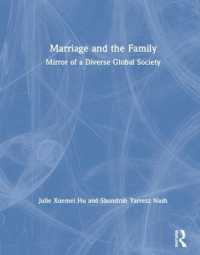- ホーム
- > 洋書
- > 英文書
- > Politics / International Relations
Full Description
First published in 1997 and written by two distinguished Russian scholars, this book examines the problems and prospects of democratic transition in Russia since the disintegration of the Soviet Union. Specifically, it offers a compelling evaluation of the rise and fall of the 1990 Russian parliament. The problems of transforming what had been a regional assembly into a national parliament are analysed in the context of the failure of perestroika, the difficulties of generating pluralist politics, the strength of presidential power and the tensions between ideologies of reform, on the one hand, and the realities of economic crisis, on the other. The analysis allows them to evaluate the role of political upheaval and conflicts of legitimacy in Russian democratization.
The book is divided into three sections. The first offers a theory of transition to modern democracy. This provides the framework for the second section, an account of the first parliament after the 1990 elections, its conflicts with presidential power and the reform agenda of the government and, finally, its fall. The third section examines three particular problems which were decisive in producing the crisis of Russian parliamentarianism and democratization: voting behaviour in a non-party parliamentary setting and its relationship to conflicts between legislature and executive; populism and representation; and the role of democratic values and procedures in the legislative process.
Drawing on their unrivalled knowledge of issues, events and actors, Nikolai Biryukov and Victor Sergeyev gather and interpret much new evidence to explore their subject. In a path-breaking study, the authors draw on a variety of sources and traditions to produce an original theory of the problems of political stability set up by democratic transition in Russia.
Contents
Part 1. Dualism and Sobornost' (a Theory). 1. Transition to Modernity and the Problem of Social Integration. 2. Pluralism and Integration. 3. Perestroika and the Crisis of Sobornost'. Part 2. The Rise and Fall of the First Russian Parliament (a History). 4. From a Regional Assembly to the National Legislature. 5. The Parliament and the Reform. 6. The Fall of the Parliament. Part 3. Parliamentary Behaviour at a Formative Stage (Three Case Studies). 7. Voting in the Russian Parliament: The Spectrum of Political Forces and the Conflict between the Executive and the Legislative. 8. The People and the Legislative: Populist Trends in Contemporary Parliamentary Discourse. 9. Legislation of the Second Republic: Democratic Values and Democratic Procedures in the Juridical Context of Sobornost'. 10. Conclusion: Transition to Democracy: Political Shock Therapy or a Conflict of Legitimacies.








